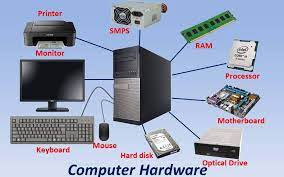"Basic Computing Courses in Pakistan"
"Basic Computing Courses in Pakistan"
Introduction:
In the fast-paced digital age, acquiring basic
computing skills is not just an option but a necessity. Pakistan, a country
with a burgeoning tech industry, recognizes the importance of empowering
individuals with foundational computing knowledge. Not just computer
students need to know the fundamentals of computers. Instead, it is a must for
everyone. Students without prior computer experience are also able to master
the fundamentals of computers at Intelliage Institute. This article delves into
the landscape of basic computing courses in Pakistan, exploring their
significance and impact.
In an era where technology is deeply interwoven into
everyday life, basic computing skills have become indispensable. From
navigating the internet to using essential software, individuals with a solid
understanding of computing are better equipped for the challenges of the modern
world.
Overview of Basic Computing Courses:
Several educational institutions and online platforms
in Pakistan offer basic computing courses catering to diverse audiences. These
courses typically cover fundamental topics such as computer hardware, software
applications, internet usage, and basic programming concepts.
Computer Hardware Fundamentals:
1.Understanding
the components of a computer system.
2.Basic
troubleshooting and maintenance.
v Introduction
to operating systems.
v Proficiency
in common office applications like Microsoft Word, Excel, and PowerPoint.
v Internet
and Communication:
Navigating the internet safely and efficiently.
Communication tools, email etiquette, and online
collaboration.
Basic Programming Concepts:
Introduction to programming languages like Python or
JavaScript.
Problem-solving and algorithmic thinking.
Where to Learn: Several institutions and
online platforms provide basic computing courses in Pakistan.
Notable options include:
Universities and Colleges: Many universities offer
short-term courses or certifications in computing skills.
Online Platforms:
Websites
like Coursera, edX, and Intelliage tranings provide accessible courses for learners of all
levels.
Benefits of Basic Computing Courses:
Employability:
Basic
computing skills enhance employability in a tech-driven job market.
Digital Literacy:
Individuals
become adept at navigating and utilizing digital resources effectively.
Basics of Data Analysis using Excel or Google Sheets
Understanding data analysis concepts.
Hands-on practice with basic data analysis using
spreadsheet software.
Entrepreneurship:
Basic
computing knowledge is crucial for aspiring entrepreneurs in managing their
ventures.
Basic Software Applications:
Word processing:
Master
the basics of word processing software (e.g., Microsoft Word, Google Docs) for
creating and editing documents.
Spreadsheet skills: Learn to use
spreadsheet tools (e.g., Microsoft Excel, Google Sheets) for tasks like data
organization, calculations, and budgeting.
Presentation software: Acquire skills in creating effective
presentations using tools like Microsoft PowerPoint or Google Slides.
File Management:
Organizing files and folders: Learn best practices for
organizing and managing files on your computer for easy retrieval.
Backup strategies: Understand the importance of
regular backups to prevent data loss and explore various backup methods.
While the availability of basic computing courses is
expanding, challenges such as accessibility and affordability persist. Efforts
to make these courses more widely available, including online options and
community initiatives, can address these challenges.
Course Content:
Understanding the basic components of a computer
system, including the CPU, RAM, storage devices, and peripherals.
Hands-on experience with assembling and disassembling
a computer.
Importance:
Empowers individuals to troubleshoot hardware issues.
Provides a foundation for those interested in pursuing
a career in IT or computer science.
Course Content:
Introduction to various operating systems (Windows,
Linux, macOS).
Proficiency in using common office applications such
as Microsoft Word, Excel, and PowerPoint.
Importance:
Enhances productivity in personal and professional
tasks.
Lays the groundwork for more advanced software usage.
Internet and Communication:
Course Content:
Safe and efficient internet usage, including browsing,
searching, and online security.
Communication tools, email etiquette, and
collaboration platforms.
Importance:
Fosters digital literacy and responsible online
behavior.
Prepares individuals for effective communication in
the digital age.
Universities and Colleges:
Many educational institutions offer short-termcourses, workshops, or certifications in basic computing skills.
Digital Literacy:
Individuals become adept at navigating and critically
evaluating digital information.
Empowers users to make informed decisions in the
digital realm.
Entrepreneurship:
Basic computing knowledge is crucial for aspiring
entrepreneurs managing their ventures.
Facilitates the use of technology in business
operations and marketing.
Challenges and Solutions:
While the demand for basic computing courses is on the
rise, challenges such as accessibility and affordability persist:
Affordability:
Government and private sector sponsorships or
scholarships for individuals with limited financial means.
Collaboration between educational institutions and
industry partners to reduce course costs.
Conclusion:
As Pakistan embraces the digital era, basic computing
skills emerge as a catalyst for individual empowerment and national progress.
The availability and accessibility of these courses reflect a commitment to
building a digitally literate society, ensuring that every citizen is equipped
to thrive in the evolving technological landscape.
In a world where technology is omnipresent, basic
computing skills empower individuals, fostering a digitally literate society.
Pakistan's embrace of these courses reflects a commitment to equipping its
citizens for success in the digital age.
.jpeg)





.jpg)
Comments
Post a Comment